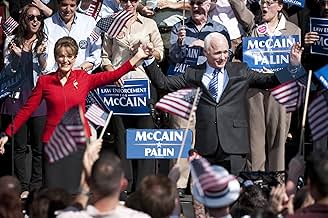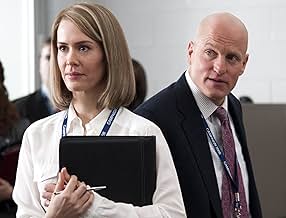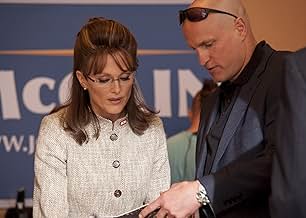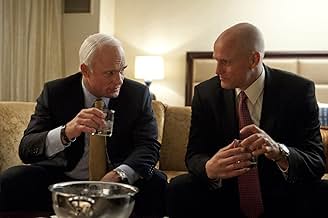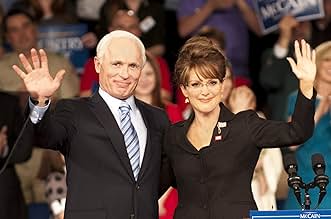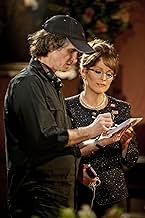Governor Sarah Palin of Alaska becomes Senator John McCain's running mate in the 2008 Presidential election.Governor Sarah Palin of Alaska becomes Senator John McCain's running mate in the 2008 Presidential election.Governor Sarah Palin of Alaska becomes Senator John McCain's running mate in the 2008 Presidential election.
- Won 5 Primetime Emmys
- 31 wins & 43 nominations total
- Director
- Writers
- All cast & crew
- Production, box office & more at IMDbPro
Storyline
Did you know
- TriviaThe real Steve Schmidt, who is played in this movie by Woody Harrelson, called the film's portrayal of him, and the events surrounding Sarah Palin's GOP nomination as the party's Vice Presidential candidate and candidacy, accurate.
- GoofsIn a scene where Ed Harris' character, John McCain, is woken up in the middle of the night, it is clear that his arms are stretched out above his head. This is not possible, as due to the years of physical abuse/torture John McCain suffered as a POW, he is unable to raise both of his arms above his head.
- Quotes
Woman: I can't trust Obama. I've read about him and he's not a... he's a... he's a Arab. He's not an Americ...
John McCain: No, ma'am. No, ma'am. He's a decent family man citizen who I just happen to have some disagreements with on certain fundamental issues. And that's what this campaign is all about.
- ConnectionsFeatured in De wereld draait door: Episode #7.93 (2012)
- SoundtracksI Feel Pretty
Written by Leonard Bernstein and Stephen Sondheim
Performed by Julie Andrews
Courtesy of Sony Music Entertainment
Featured review
There will be a lot of people who see "Game Change" and will absolutely hate it. No doubt, Sarah Palin, if she chooses to watch it, will probably be one of those people. I can't imagine a Democrat hating the movie. Either way, you can't talk about "Game Change" without feeling the bottoms of your shoes slightly thump against a soap box.
I personally don't know how accurate "Game Change" is. The film is based upon one-third of the 2010 bestseller of the same name by John Heilemann and Mark Halperin. Their book, detailing the entire 2008 Presidential election and allegations thereof in both parties, had been criticized for relying on too many anonymous sources and lacking explicit sourcing.
This movie, written by Danny Strong and directed by Jay Roach, takes the most intriguing segment of the 2008 election, namely the nomination and introduction of Republican Vice Presidential candidate Sarah Palin, and lets the ridiculousness of the events surrounding her expose itself.
Like "Recount" (2008), the previous collaboration between Roach and Strong, what is most astounding about this movie is not the events in it, but that we actually lived through them not too long ago. To paraphrase Hannibal Lector, anyone labeling this movie as exploitation only needs to see the barrage of CNN and Fox News footage in this film to remind themselves that the past is real.
"Recount" told the story of the chaotic 2000 election returns, and how little Al Gore and George W. Bush actually had to do with the transpired events, contrary to popular opinion. "Game Change" shows the interactions between those in and out of the spotlight, and how candidates in an election can be the cause of their own undoing.
The film centers around Steve Schmidt (Woody Harrelson), Senator John McCain's chief political adviser during his 2008 campaign for President. After winning the Republican nomination despite being last in the polls in 2007, McCain (Ed Harris) finds himself relying on Schmidt and other political advisers to find a V.P. candidate. Behind in the polls against Senator Barack Obama, he agrees to choose a female running mate to put him at an advantage against the first African-American nominee for President.
National Campaign Manager Rick Davis (Peter MacNicol) does his homework on a viable female candidate via a YouTube search in the only really inconsistent part of the film. You see him watch videos of female Republican politicians ranging from then-Hawaiian Governor Linda Lingle to Maine Senator Susan Collins. What you don't see clearly is Davis' rationale behind not choosing one of these women. Why would Senator Collins not be a better choice than Sarah Palin? Of course, being originally from Maine, I am biased.
What you learn from this movie is that while the Republican strategists did some homework on the then-Alaska Governor, they should have done more. This fact becomes apparent when Governor Palin (Julianne Moore) does not know, among other things, that the British Prime Minister is the head of government in Great Britain, not the Queen of England.
In what could have been a farcical portrayal of a politician of whom it's easy to make fun, Julianne Moore is astonishingly great as Sarah Palin. Like Al Pacino as Dr. Jack Kevorkian in "You Don't Know Jack" (2010), Moore is so believable as Palin that you would swear Palin was playing herself.
More than having the "You betcha!" accent down pat, Moore never has one wavering moment where you think you're watching the same actress from "Boogie Nights" (1997) or "The Kids Are All Right" (2010). She nails every aspect about Palin from her firm belief in her politics, her reactions to the press, her ill preparation for the notorious Katie Couric interview, and her butting heads with political advisers. It's all completely believable.
While there was less pressure on Harrelson to play a public figure, he also did a great job as an adviser whose recommendation to nominate Palin truly seemed like a good idea at the time. Harrelson's Schmidt more or less regrets his decision to convince McCain, only to try to make the best of it later on.
Also equally effective is Sarah Paulson, who plays senior adviser Nicholle Wallace. In the scenes where she tries in vain to help Palin properly prepare for the Katie Couric interview, it's like watching an A-student try to get a D-student to study for a final exam. Considering how the real Palin bombed that interview, that scene could not have been far from the truth. Paulson really reflects Wallace's frustration well, and is believably too tired in the end to say she told her so.
Ed Harris, while not doing a dead-on imitation of John McCain, effectively reflects the frustration and regret McCain must have felt after choosing Palin as a running mate. McCain may have been capable of dealing with the failing economy and foreign relations, but Palin clearly was not.
While Palin may not have been the sole contributor to McCain's defeat, she undoubtedly threw an anchor off the side of the Straight Talk Express. In the end, Harrelson, as Schmidt, probably would not answer "no" to Anderson Cooper's question of whether he regretted putting Palin on the ticket. His actions and reactions throughout the movie answer that question already.
I personally don't know how accurate "Game Change" is. The film is based upon one-third of the 2010 bestseller of the same name by John Heilemann and Mark Halperin. Their book, detailing the entire 2008 Presidential election and allegations thereof in both parties, had been criticized for relying on too many anonymous sources and lacking explicit sourcing.
This movie, written by Danny Strong and directed by Jay Roach, takes the most intriguing segment of the 2008 election, namely the nomination and introduction of Republican Vice Presidential candidate Sarah Palin, and lets the ridiculousness of the events surrounding her expose itself.
Like "Recount" (2008), the previous collaboration between Roach and Strong, what is most astounding about this movie is not the events in it, but that we actually lived through them not too long ago. To paraphrase Hannibal Lector, anyone labeling this movie as exploitation only needs to see the barrage of CNN and Fox News footage in this film to remind themselves that the past is real.
"Recount" told the story of the chaotic 2000 election returns, and how little Al Gore and George W. Bush actually had to do with the transpired events, contrary to popular opinion. "Game Change" shows the interactions between those in and out of the spotlight, and how candidates in an election can be the cause of their own undoing.
The film centers around Steve Schmidt (Woody Harrelson), Senator John McCain's chief political adviser during his 2008 campaign for President. After winning the Republican nomination despite being last in the polls in 2007, McCain (Ed Harris) finds himself relying on Schmidt and other political advisers to find a V.P. candidate. Behind in the polls against Senator Barack Obama, he agrees to choose a female running mate to put him at an advantage against the first African-American nominee for President.
National Campaign Manager Rick Davis (Peter MacNicol) does his homework on a viable female candidate via a YouTube search in the only really inconsistent part of the film. You see him watch videos of female Republican politicians ranging from then-Hawaiian Governor Linda Lingle to Maine Senator Susan Collins. What you don't see clearly is Davis' rationale behind not choosing one of these women. Why would Senator Collins not be a better choice than Sarah Palin? Of course, being originally from Maine, I am biased.
What you learn from this movie is that while the Republican strategists did some homework on the then-Alaska Governor, they should have done more. This fact becomes apparent when Governor Palin (Julianne Moore) does not know, among other things, that the British Prime Minister is the head of government in Great Britain, not the Queen of England.
In what could have been a farcical portrayal of a politician of whom it's easy to make fun, Julianne Moore is astonishingly great as Sarah Palin. Like Al Pacino as Dr. Jack Kevorkian in "You Don't Know Jack" (2010), Moore is so believable as Palin that you would swear Palin was playing herself.
More than having the "You betcha!" accent down pat, Moore never has one wavering moment where you think you're watching the same actress from "Boogie Nights" (1997) or "The Kids Are All Right" (2010). She nails every aspect about Palin from her firm belief in her politics, her reactions to the press, her ill preparation for the notorious Katie Couric interview, and her butting heads with political advisers. It's all completely believable.
While there was less pressure on Harrelson to play a public figure, he also did a great job as an adviser whose recommendation to nominate Palin truly seemed like a good idea at the time. Harrelson's Schmidt more or less regrets his decision to convince McCain, only to try to make the best of it later on.
Also equally effective is Sarah Paulson, who plays senior adviser Nicholle Wallace. In the scenes where she tries in vain to help Palin properly prepare for the Katie Couric interview, it's like watching an A-student try to get a D-student to study for a final exam. Considering how the real Palin bombed that interview, that scene could not have been far from the truth. Paulson really reflects Wallace's frustration well, and is believably too tired in the end to say she told her so.
Ed Harris, while not doing a dead-on imitation of John McCain, effectively reflects the frustration and regret McCain must have felt after choosing Palin as a running mate. McCain may have been capable of dealing with the failing economy and foreign relations, but Palin clearly was not.
While Palin may not have been the sole contributor to McCain's defeat, she undoubtedly threw an anchor off the side of the Straight Talk Express. In the end, Harrelson, as Schmidt, probably would not answer "no" to Anderson Cooper's question of whether he regretted putting Palin on the ticket. His actions and reactions throughout the movie answer that question already.
Details
- Runtime1 hour 58 minutes
- Color
- Sound mix
- Aspect ratio
- 1.78 : 1
Contribute to this page
Suggest an edit or add missing content


